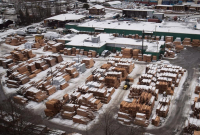The United States will continue to hammer imported Canadian softwood lumber, but the U.S. Commerce department said Thursday that it will impose smaller penalties than originally announced.
In its final determination, Commerce said most Canadian producers will pay a combined countervailing and anti-dumping rate of 20.83 per cent, down from 26.75 per cent in the preliminary determinations issued earlier this year.
"While I am disappointed that a negotiated agreement could not be made between domestic and Canadian softwood producers, the United States is committed to free, fair and reciprocal trade with Canada," U.S. Commerce Secretary Wilbur Ross said in a news release.
"This decision is based on a full and unbiased review of the facts in an open and transparent process that defends American workers and businesses from unfair trade practices."
The Trudeau government responded by saying it will continue to defend the Canadian lumber industry against protectionist trade measures, including possibly turning to litigation.
Foreign Affairs Minister Chrystia Freeland and Natural Resources Minister Jim Carr called the punitive duties "unfair, unwarranted and deeply troubling."
"We urge the U.S. administration to rescind these duties, which harm workers and communities in Canada," they said in a joint statement.
Carr plans to convene the Federal-Provincial Task Force on Softwood Lumber in the coming days to discuss developments.
The preliminary duties have forced Canadian companies to pay hundreds of millions of dollars in deposits, which could be refunded if they win a final ruling by the U.S. International Trade Commission around Dec. 18.
The duties have driven up the price of lumber, adding to the cost of building a home in the United States. Canadian unions and lumber companies fear the issue will eventually cause layoffs.
West Fraser Timber (TSX:WFT) will continue to pay the highest duties, but its total is being cut to 23.7 per cent from 30.88 per cent.
Canfor (TSX:CFP) is next at 22.13, down from 27.98, Tolko at 22.07 vs. 27.03.
The rate for Montreal-based Resolute Forest Products (TSX:RFP) rises marginally to 17.9 per cent from 17.41 per cent and J.D. Irving's rate inches up to 9.92 per cent from 9.89 per cent.
B.C. lumber producers said they are disappointed by the revised duties, even though they are lower.
"As we have consistently said, these duties are unwarranted and this trade action is completely without merit," said Susan Yurkovich, president of the B.C. Lumber Trade Council.
She said Western producers believe reaching a new agreement is the best solution but the U.S. industry doesn't appear to be interested in finding a durable solution.
B.C. Premier John Horgan said Canada needs to stay united in its approach to ongoing dispute over trade in softwood lumber with the U.S.
"People need to understand this is a small group of people affecting millions and millions of peoples lives," he said at a news conference at B.C.'s legislature. "Unfortunately, it's the narrow interests of a few greedy lumber barons in the southern states that has led us to this impasse."
The U.S. Lumber Coalition countered that massive Canadian subsidies have caused real harm to U.S. producers and their workers.
"We are pleased the U.S. government is enforcing our trade laws so that the U.S. lumber industry can compete on a level playing field," said coalition co-chairman Jason Brochu.
But Resolute called the final determination outrageous, saying it only benefits large timber barons whose land is more valuable from higher tariffs.
"It's helping a handful of companies motivated by their own narrow self interests at the expense of the greater North American economy and millions of jobs," spokesman Seth Kursman said in an interview.
The head of the Quebec Forest Industry Council was less critical.
"Of course, we would like the rates to be zero, but, the imposed rates do not cause the (commotion) like it did for Bombardier," said former MP and council president Denis Lebel.
The softwood lumber duties are a double-whammy for the U.S. housing sector, which is expected to have mortgage interest deductibility on new home purchases capped at US$500,000 during the federal tax overhaul.
Granger MacDonald, chairman of the National Association of Home Builders, said the softwood tariffs come as home builders and homeowners are rebuilding in the aftermath of hurricanes and California wildfire.
"This tariff only adds to the burden by harming housing affordability and artificially boosting the price of lumber. It is nothing more than a thinly-disguised tax on American home buyers, home builders and consumers."
Lumber products certified by the Atlantic Lumber Board as being first produced in Newfoundland and Labrador, Nova Scotia or Prince Edward Island are excluded from any duties.
Also excluded is U.S. lumber shipped to Canada for some processing and imported back into the U.S., certain box spring kits, and box-spring frame components.
The United States imported US$5.66 billion worth of softwood lumber last year from Canada.



Comments